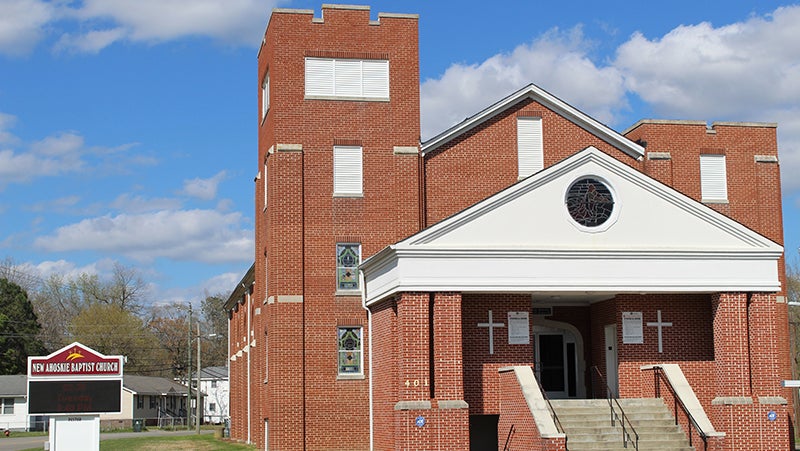The path to freedom
Published 5:41 pm Tuesday, April 20, 2021

- New Ahoskie Baptist Church has been selected among the first three locations statewide to be designated as part of the North Carolina Civil Rights Trail. Staff Photo by Holly Taylor
|
Getting your Trinity Audio player ready...
|
AHOSKIE – There have been times in the history of our nation where despite fear of retribution, and even death, individuals have stepped forward to lend their voices for justice and equality.
Such was a time across the South, to include the Roanoke-Chowan area, where people of color were treated as second-class citizens. They were shut out of middle class income employment, skilled jobs, voting, jury service, and equal educational opportunities and funding. And all this came while they continued to endure the mental and physical pain of racial intimidation.
“Most people of color felt that little had changed since 1865, the end of slavery or 1877, the end of Reconstruction,” stated Cofield native Marvin Jones, currently living in Washington, D.C. where he operates the Chowan Discovery Group.
Jones said the oppressed of that era opted to take a stand for a better way of life.
“The Civil Rights rallies at New Ahoskie Baptist Church energized the African American community and its leaders to push for positive change against the bewildering varieties of racial oppression,” Jones said. “Our leaders confronted and negotiated with the local governments and businesses for fairer opportunities in education, local governance, hiring, citizenship, public safety, healthcare, public access and social services.”
Now, nearly three-quarters of a century later, a marker is scheduled to be placed on the grounds of New Ahoskie Baptist Church, signifying it as part of the North Carolina Civil Rights Trail. The trail will physically mark sites across the state that are critical to the Civil Rights Movement in North Carolina.
The N.C. African American Heritage Commission is leading the initiative with funding from the William G. Pomeroy Foundation, and with support from Visit North Carolina, and the North Carolina Office of Archives & History. The commission will work with communities across the state to designate up to 50 sites where trail markers will be placed. An interactive web portal will highlight these places and others to guide people to history and experiences from the past.
In addition to the one at New Ahoskie Baptist, the first of the markers will be placed in uptown Shelby, where sit-ins led by high school students there were held in February 1960, and at Adkin High School in Kinston, where students walked out in protest of inferior facilities. Their protests eventually led to the construction of new classrooms and a gymnasium.
The three markers are scheduled for installation this summer.
For Jones, the memories of the Civil Rights rallies at New Ahoskie Baptist remain fresh in his mind.
“My father took us to those rallies at the church when I was about 11-years-old,” Jones recalled. “One evening the featured speaker was Golden Frinks, who led widespread efforts across eastern NC. I was surprised to later learn that he died a natural death in his eighties, given the dangers then of even minding one’s own business let alone openly challenging entrenched racial oppression.
“I got to closely see what righteous courage truly was in my own small sphere and carried forth by people I knew; that daring for change was not only in far away places but in one’s home county,” Jones continued. “That courage came with lifelong results that benefited everyone I knew. Others and me want those powerful efforts remembered in the Roanoke-Chowan area. The United States of America always advances from such bravery and forthrightness whether during the American Revolution, the Civil War, World War II and the Civil Rights era, and our area residents played a part.”
Jones identified those locally who were part of the Civil Rights rallies at New Ahoskie Baptist in the 1950s and 60s, to include Rev. John L. Scott and Rev. William Tyree – both pastors of New Ahoskie – Tyree’s brother Gerald Tyree, Raymond Grant, Clarence Shaw Newsome and Roy Marsh – all of New Ahoskie – Rev. James A. Felton of Winton; Rev. Melvin Creecy of Murfreesboro, Rev. Chester A. Hart of Philippi Baptist, Harrellsville Chapel Baptist and other churches, and George Hall Jr., Collis Brown, Augustus Chavis and Howard Hunter Sr. of Pleasant Plains Church.
Jones added that Hall, supported by the local NAACP, took part in the historic last march from Selma to Montgomery in Alabama in 1965. There he met Viola Liuzzo, a volunteer from Michigan who was killed during that time by the Ku Klux Klan.
The Chowan Discovery Group took an active role in advising officials at New Ahoskie Baptist through the nomination process with the NC African American Heritage Commission that eventually led to the church being chosen as one of the first three sites statewide to be placed on the Civil Rights Trail.
“The main historical sources were the intrepid Reverend John L. Scott’s autobiography CIVIL RIGHTS VOICE FOR THE OPPRESSED, news articles, Charlie Morris [Chairman of the New Ahoskie Baptist Board of Deacons], and my memories,” Jones noted.
When asked about what historical and educational roles this marker in Ahoskie will play, Jones stated, “[It] can be an important element in telling other untold stories from our history. I recently gave a shortened but structured Winton Triangle tour to students from UNC-Chapel Hill. A tour like that can add to Hertford County’s efforts toward the business of tourism.”
“These first three trail markers are the culmination of tireless efforts given by many individuals, organizations and communities. We commend them for highlighting this significant history and helping to make the N.C. Civil Rights Trail a reality,” said Deryn Pomeroy, the William G. Pomeroy Foundation’s Director of Strategic Initiatives.
“The national reckoning over systemic injustice heightens the relevance of our effort to develop the N.C. Civil Rights Trail,” said Angela Thorpe, director of the African American Heritage Commission, which is part of the N.C. Department of Natural and Cultural Resources. “Understanding what has come before will inspire and fuel the work ahead. We need to hear the voices and proclaim the victories that have brought us this far.”
“Those sites underscore North Carolina’s role in channeling student energy into the movement,” said Visit NC Director Wit Tuttell. “We’re excited about providing a more comprehensive look at what has unfolded across the state and give residents and visitors an opportunity to share the experience.”
Thorpe expects the trail to include a wide array of locations, including established historic sites as well those that may only be known more locally. One example is the YMI Cultural Center in Asheville, which was commissioned in 1892 for Black construction workers employed to build and furnish the Biltmore estate. Funded by the Vanderbilts, the Young Men’s Institute became a center of civil, cultural and business life in the neighborhood known as The Block. Featuring a gym, bathing facilities and a library, the building was used by churches, schools and civic organizations for classes, gatherings and office space. After urban renewal led to the neighborhood’s mid-century decline, the YMI Cultural Center reclaimed its place in the 1980s and is poised as a neighborhood focal point amid new energy in preservation, restoration and advancement throughout The Block.
Other candidates for markers include the Montford Point Marines Museum, which tells the story of the first African Americans to serve in the U.S. Marine Corps (1942-49), and the Montford Point Marines Memorial in Jacksonville; the Pauli Murray Center in Durham, where the influential lawyer, Episcopal priest, and activist for civil and women’s rights grew up; and the Historic Magnolia House in Greensboro, a Green Book site that hosted Black entertainers, icons, and civil rights leaders.
The second round of applications for the program are open March 2021 through October 2021. To learn more about the project or to apply for a marker, please visit: https://aahc.nc.gov/programs/civil-rights-trail.



